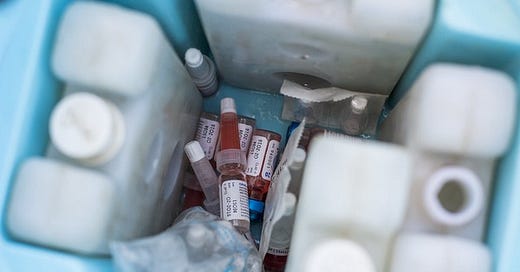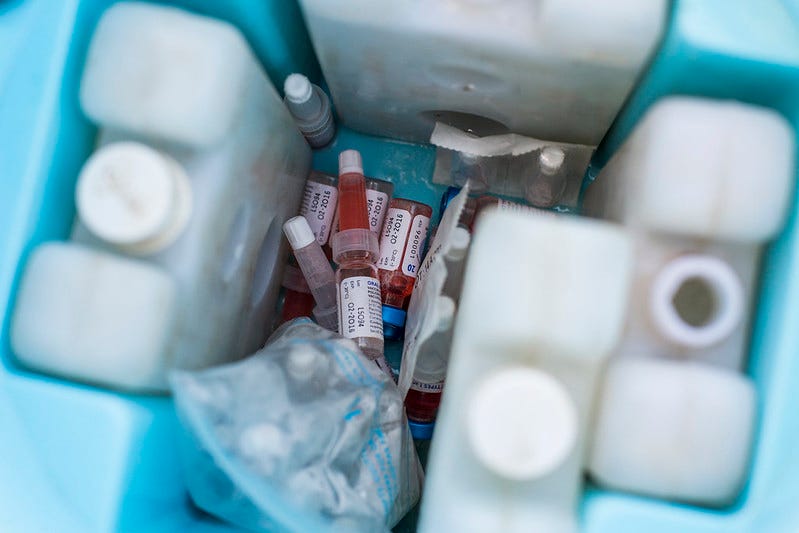How can we make the greatest impact in this global pandemic?
I am grateful that companies like Moderna have successfully produced a lifesaving vaccine. But that vaccine can’t bring an end to this pandemic if the rest of the world isn’t able to obtain it.
We’re in the midst of the second holiday season of this pandemic, and as Americans, we have many reasons to be thankful. Among our top reasons for gratitude this year is that mass immunization has helped cut COVID-19 cases in half in the U.S. since summer’s peak. Nearly 200 million Americans are vaccinated, and we have ample supply on hand for youth and adults. However, the picture is not as bright in the developing world: As of October, just 4.4% of Africa’s population was fully vaccinated. The new Omicron variant has made clear that in a globalized society, low vaccination rates anywhere pose problems everywhere. If we want to avoid a global catastrophe, we must scale up our efforts to help the rest of the world get relief from this disease. U.S. manufacturers must step up and deliver billions of vaccine doses in low- and middle-income countries.
That includes Moderna. I applaud Moderna for delivering 500 million doses to COVAX, the United Nations’ affordable vaccination program. But as we face a new strain with the Omicron variant and more unknowns about COVID-19, now is the time to increase those commitments. Moderna has so far refused to do so due to concerns about its bottom line. The company’s financial concern is particularly problematic because the federal government gave Moderna $6 billion dollars to bring its vaccine to market—far more government funding than its competitors received.
Also, the company has refused to sell its vaccine at cost and Moderna’s vaccine price for low- and middle-income countries far exceeds what it charges higher-income countries, according to an analysis by the non-profit advocacy group Global Citizen. The New York Times reports countries like Botswana and Columbia are paying twice what the U.S. paid per dose—and they’re the lucky ones. Moderna has also supplied 97% of its vaccines to wealthy nations, while its competitors’ distributions have been more even around the globe. Moderna has also resisted pressure to share its vaccine technology with the world, limiting the ability of low- and middle-income countries to make doses for themselves.
The Biden Administration has pushed back, issuing an official warning that Moderna needs to increase its contributions. David Kessler, the White House’s chief science officer, called the company’s actions “unconscionable.” The good news is that Moderna has announced a deal with the African Union to send them 110 million doses over the coming months. This is a welcome first step.
I am grateful that companies like Moderna have successfully produced a lifesaving vaccine. But that vaccine can’t bring an end to this pandemic if the rest of the world isn’t able to obtain it. The Omicron variant proves the point made by health leaders like Asia Russell, the executive director of Health GAP, the Global Access Project. She has said that we are in “race of vaccines and therapeutics against variants” and that we are moving too slow. To prevent the world from seeing even more dangerous mutations of this virus, wealthy nations and vaccine manufacturers like Moderna must work to accelerate global vaccine distribution.
I hope that vaccine manufacturers, elected officials, and global leaders will work together and continuously discuss, “how can we make the greatest impact?” Because that is how we move beyond this global pandemic and there is simply no time to waste.
Jenn Stephens is Oregon born, raised, and educated. Loved Austin, TX, then moved back home to raise our three boys. Political nerd, MBA, and passionate about helping people.
"Polio Vaccination Campaign in South Sudan" by United Nations Photo is licensed under CC BY-NC-ND 2.0





Moderna you would think has an especially strong reason to work with the US government to promote distribution of their vaccine. The NIH was at the very least crucial to the research that was behind the vaccine, but Moderna is focusing on profit at all points. They haven't received a patent on their vaccine because they are fighting with NIH over control of the crucial patient.
for instance see:
https://www.nature.com/articles/d41586-021-03535-x
The extent to which Moderna is going to prioritize profits over public should be a problem, but most Pharma companies have learned that it really doesn't matter what the public may think of them.
Moderna is a private company and makes decisions for their company. It makes no business sense to giveaway formulas. The government cannot seem to do anything in an efficient or cost effective manner. Look at our national debt, the over spending year after year and Democrats tax tax tax. We should be thankful Moderna and Pfizer stepped forward.